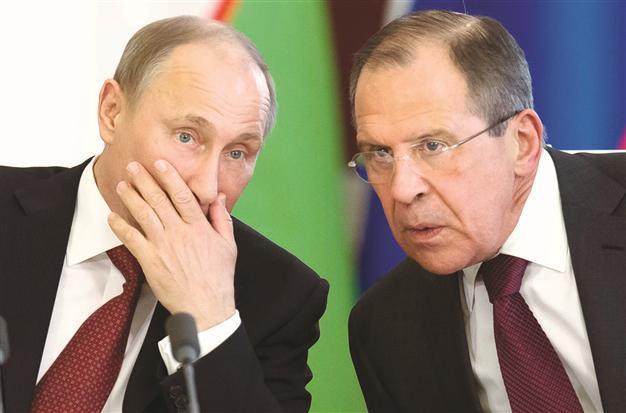US missile shield ‘bluff,’ not a threat for Russia
MOSCOW

Russian President Putin (L) listens to FM Lavrov during ceremony in Kremlin. Russian Deputy PM Rogozin said US missile shield poses no threat. AP photo
Russia’s strategic forces are capable of penetrating the U.S. missile shield and it poses no military threat to the country, Russian Deputy Prime Minister Dmitry Rogozin said yesterday.“We have solved the issue of penetrating the missile shield. We regret that the United States waste their money on missile defense and compel us to do the same. The missile shield is nothing for us, it’s a bluff. It poses no military threat, but remains a political and economic problem,” Rogozin was quoted as saying by Russian news agency Ria Novosti during his speech at the Russian Embassy in London.
‘Excessive by nature’
The U.S. missile defense plan for Europe envisages a powerful radar in Turkey, SM-3 interceptors aboard naval ships in the Mediterranean and dozens of interceptors based in Poland and Romania. Turkey agreed to allow the U.S. military to install special early-warning radar in 2011 as part of the NATO system.
But budget pressures and the threat posed by North Korea’s missile program led U.S. Secretary of Defense Chuck Hagel to announce last month that Washington was scrapping the fourth and final stage of the system, which would have deployed a more advanced version of the SM-3 interceptor in Poland and Romania within 10 years. Instead, the Pentagon plans to add 14 interceptors to missile defenses in Alaska at a cost of $1 billion.
Moscow has long been at odds with the West over anti-missile defenses it has begun to establish in Europe, which both the U.S. and NATO have said are aimed at preventing any attack from Iran and pose no threat to old Cold War foe Russia. Russia has long argued that the shield was aimed against its own nuclear deterrent and has held up negotiations on other disarmament agreements as a result.
Rogozin said most of Russia’s criticism was caused by the fact that the planned missile shield was “provocative” and “excessive by nature” and thus forced other countries to boost their strategic defenses. The deputy prime minister said Russia was “compelled to search for a wise and asymmetric response.”
Russia to renew its strategic forces
“We are carrying out a rearmament program until 2020, it would enable us to renew the hundred percent of our strategic forces. It will be done within the framework of international commitments,” he said. Russia will not need a great number of missiles to attain the objective, but will use new technical solutions that make it possible to change movement physics and avoid interception systems, according to Rogozin.
NATO has also waded into the debate and said it hoped a U.S. change to missile defenses would dispel Russian concern.
“The change in the U.S. plans ... just simply makes the situation much less ambiguous,” alliance Deputy Secretary-General Alexander Vershbow said in a recent interview. “There is now no reason for concern that the system going into Europe will have any effect whatever on Russia’s strategic deterrent.”
















